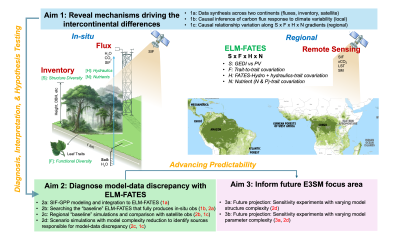Amazon vs Congo: Understanding the Intercontinental Differences of Tropical Rainforests' Responses to Climate Variability
Project Team
Principal Investigator
Co-Principal Investigator
Project Participant
Tropical rainforests play a vital role in shaping the strength of the global carbon sink, and in regulating the feedbacks between the terrestrial carbon cycle and climate. The past decades have witnessed dramatic changes in the carbon cycling of tropical rainforests, altered by climate change/variability and anthropogenic activities. These changes have distinctively impacted the two largest continuous rainforests in the world, the Amazon and the Congo. However, it remains poorly understood which mechanistic drivers are responsible for the intercontinental differences in tropical rainforest responses to climate variability, what is the impact of such differences on the future tropical carbon sink strength, and how the resulting climate feedbacks affect the global system.
Current Earth System Models (ESMs) projections diverge markedly in the magnitude and sign of the future global terrestrial carbon sink, with significantly greater uncertainty in the tropics than the rest of the globe. Moreover, to date, most ESMs fail to accurately reproduce the observed tropical carbon cycle dynamics or their responses to climate variability, especially the observed intercontinental differences between Amazon and Congo.
To fill these knowledge gaps and reduce uncertainty in ESM model predictions, this proposal aims to 1) advance mechanistic understanding of the ecological drivers underlying the intercontinental differences in the responses of mature, intact rainforests to climate variability between Amazon and Congo, and 2) identify the sources of ESM model uncertainties in characterizing such intercontinental differences. To achieve these goals, we will utilize DOE’s Energy Exascale Earth System Model (E3SM) as the modeling platform, and integrate simulations of ELM-FATES (Energy Land Model - Functionally Assembled Terrestrial Ecosystem Simulator) with a diverse suite of observations (in-situ inventories, eddy covariance fluxes, solar-induced chlorophyll fluorescence (SIF), and other satellite measurements) that span from local to regional scales. Specifically, we have three interconnected research tasks:
-
Task 1: Characterize carbon cycle responses to climate variability of the mature, intact rainforests in the Amazon and Congo ecoregions from seasonal to decadal scales and understand the roles of canopy structural heterogeneity, plant functional diversity, and plant-soil hydraulic and nutrient limitations underlying the distinct responses between the two continents.
-
Task 2: Identify and attribute the key mechanisms driving the discrepancy between existing ESMs and observations in reproducing the intercontinental differences by conducting ELM-FATES simulations with varying levels of model complexity.
-
Task 3: Inform future ELM-FATES development focus areas for improving future projections of the carbon cycles and resulting climate feedbacks.
This project focuses on “quantifying and understanding the interactions and feedbacks between biogeochemical cycles and the Earth system in the context of ESMs” in tropical rainforests and will “help identify and reduce biases in regional model projections across scales,” both of which strongly align with the scope of RGMA. The scientific insights gained and data/modeling capabilities developed from this project will greatly complement and strengthen future research for DOE-BER, and also guide priorities for data acquisition and process understanding in future terrestrial ecology campaigns in the tropical rainforests.

